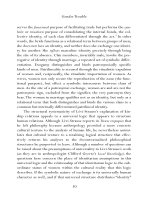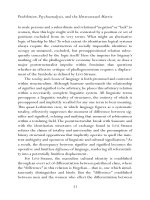GENDER TROUBLE 94
Bạn đang xem bản rút gọn của tài liệu. Xem và tải ngay bản đầy đủ của tài liệu tại đây (20.75 KB, 1 trang )
Prohibition, Psychoanalysis, and the Heterosexual Matrix
women’s own desire (a double renunciation, in fact, corresponding to
the “double wave” of repression that Freud claimed founds femininity),15 which is the expropriation of that desire as the desire to be
nothing other than a reflection, a guarantor of the pervasive necessity
of the Phallus.
On the other hand, men are said to “have” the Phallus, yet never to
“be” it, in the sense that the penis is not equivalent to that Law and
can never fully symbolize that Law. Hence, there is a necessary or presuppositional impossibility to any effort to occupy the position of “having” the Phallus, with the consequence that both positions of “having”
and “being” are, in Lacan’s terms, finally to be understood as comedic
failures that are nevertheless compelled to articulate and enact these
repeated impossibilities.
But how does a woman “appear” to be the Phallus, the lack that
embodies and affirms the Phallus? According to Lacan, this is done
through masquerade, the effect of a melancholy that is essential to the
feminine position as such. In his early essay, “The Meaning of the
Phallus,” he writes of “the relations between the sexes”:
Let us say that these relations will revolve around a being and a
having which, because they refer to a signifier, the phallus, have the
contradictory effect of on the one hand lending reality to the subject
in that signifier, and on the other making unreal the relations to be
signified.16
In the lines that directly follow this sentence, Lacan appears to
refer to the appearance of the “reality” of the masculine subject as well
as to the “unreality” of heterosexuality. He also appears to refer to the
position of women (my interruption is within brackets): “This follows
from the intervention of an ‘appearing’ which gets substituted for the
‘having’ [a substitution is required, no doubt, because women are said
not “to have”] so as to protect it on one side and to mask its lack on
the other.” Although there is no grammatical gender here, it seems
that Lacan is describing the position of women for whom “lack” is
59









